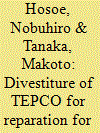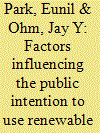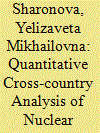|
|
|
Sort Order |
|
|
|
Items / Page
|
|
|
|
|
|
|
| Srl | Item |
| 1 |
ID:
116934


|
|
|
|
|
| Publication |
2012.
|
| Summary/Abstract |
The Fukushima Daiichi Nuclear Power Station held by Tokyo Electric Power Company (TEPCO) had a serious nuclear accident in March 2011. TEPCO's liability for the losses caused by this accident is speculated to reach several trillion yen. For this compensation, TEPCO is supposed to sell its assets, including those for its power business. Their sales are crucial for its solvency. We estimate the fundamental values of TEPCO's thermal plants by modeling their plant operation patterns based on spot market prices and fuel costs. Then, we discuss the implication of their divestiture for TEPCO's reparations in the context of the regulatory reforms as a radical path to unbundling, which has not yet been achieved due to the strong resistance from the incumbents.
|
|
|
|
|
|
|
|
|
|
|
|
|
|
|
|
| 2 |
ID:
127208


|
|
|
|
|
| Publication |
2014.
|
| Summary/Abstract |
The Fukushima accident has influenced public attitudes toward energy sources and technologies, including not only nuclear energy, but also other energy sources. Therefore, it is worth investigating how the accident influenced public perceptions of renewable energy and its technologies, between the time before the accident and after the accident. This study aims to explore the effects of the Fukushima accident on the public perceptions of renewable energy technologies in South Korea, the closest nation to Japan. This study found that there were notable differences of public perceptions, including public attitudes, perceived benefits, trust, intention to use, knowledge and risks between before and after the earthquake. In addition, the perceived cost of renewable energy technologies was the primary determinant of the intention to use the technologies before the accident, whereas public attitudes toward the technologies became the main antecedents of the intention after the accident. After the accident, we found that there is a multi-dimensional matrix of perceived trust-benefits (with risks)-attitude-intention to use, in explaining the public acceptance of renewable energy technologies. Moreover, we found significant roles of the perceived trust, benefits and risks in the research model. Based on the empirical findings, both implications and suggestions are presented.
|
|
|
|
|
|
|
|
|
|
|
|
|
|
|
|
| 3 |
ID:
117285


|
|
|
|
|
| Publication |
2013.
|
| Summary/Abstract |
The Fukushima nuclear accident on March 11, 2011 in Japan has severely dented the prospects of growth of civilian nuclear power in many countries. Although Japan's worst nuclear accident was triggered by an unprecedented earthquake and tsunami, inadequate safety countermeasures and collusive ties between the plant operators, regulators, and government officials left the Fukushima Daiichi nuclear plant beyond redemption. A critical examination of the accident reveals that the accumulation of various technical and institutional lapses only compounded the nuclear disaster. Besides technical fixes such as enhanced engineering safety features and better siting choices, the critical ingredient for safe operation of nuclear reactors lie in the quality of human training and transparency of the nuclear regulatory process that keeps public interest-not utility interest-at the forefront. The need for a credible and transparent analysis of the social benefits and risks of nuclear power is emphasized in the context of energy portfolio choice.
|
|
|
|
|
|
|
|
|
|
|
|
|
|
|
|
| 4 |
ID:
180249


|
|
|
|
|
| Summary/Abstract |
Nuclear power has always been a controversial issue since it was discovered as a source of power for civil use. Despite being a global phenomenon, nuclear power is viewed differently around the world, and consequently, different discourses have had different outcomes. This study does a comparative analysis of nuclear power discourses between India and Russia, two countries of distinct political systems. This study analyses the media coverage and content of the main discourse themes in India’s and Russia’s print media from March 2011 to March 2019. The study finds that in both countries, despite their different political set-ups, nuclear power discourse has a pro-nuclear character.
|
|
|
|
|
|
|
|
|
|
|
|
|
|
|
|
| 5 |
ID:
169760


|
|
|
|
|
| Summary/Abstract |
Due to significant cost advantages, wind energy penetrated the energy mix of most large countries much faster than solar PV did until the recent decade. However, Japan has been almost one-sidedly leaning toward the more expensive solar PV. For using solar PV electricity, the Japanese consumers are also paying sizably higher tariffs than those in other countries, especially after the Fukushima nuclear accident in 2011 that led to the sudden suspension of all nuclear power plants. Japan's energy transition towards renewables is accordingly largely single legged, rather than more balanced to take advantage of both wind turbines and solar PV. This article explains the puzzle on why renewable energy development in Japan has created such a wide distance from more economically optimal situations. We focus on the initiation, formation and impacts of the solar lobby that comprises bureaucracies, politicians, solar PV manufacturers, and independent power producers. Policy implications are drawn for Japan and other countries on the importance of controlling political lobby to achieve less costly energy transition.
|
|
|
|
|
|
|
|
|
|
|
|
|
|
|
|
| 6 |
ID:
118944


|
|
|
|
|
| Publication |
2013.
|
| Summary/Abstract |
The Fukushima catastrophe is a turning point in the conception, role and management of technology in industrial societies. As did Hiroshima (on another dimension) after 1945, the Fukushima nuclear accident questions and transforms established conceptions and values concerning the relations between technology, politics, industry, society and the environment. It has become impossible to think after Fukushima as we did before. This catastrophe initiates a major epistemic and conceptual shift with long-term consequences. This paper focuses on a powerful conceptual complex associating the notions of risk, trust and knowledge society. This complex associates discourses, theories and policies. The objective is to criticize this conceptual complex in order to explore how to rethink, after Fukushima, the relations between technology, politics, industry and society.
|
|
|
|
|
|
|
|
|
|
|
|
|
|
|
|
|
|
|
|
|